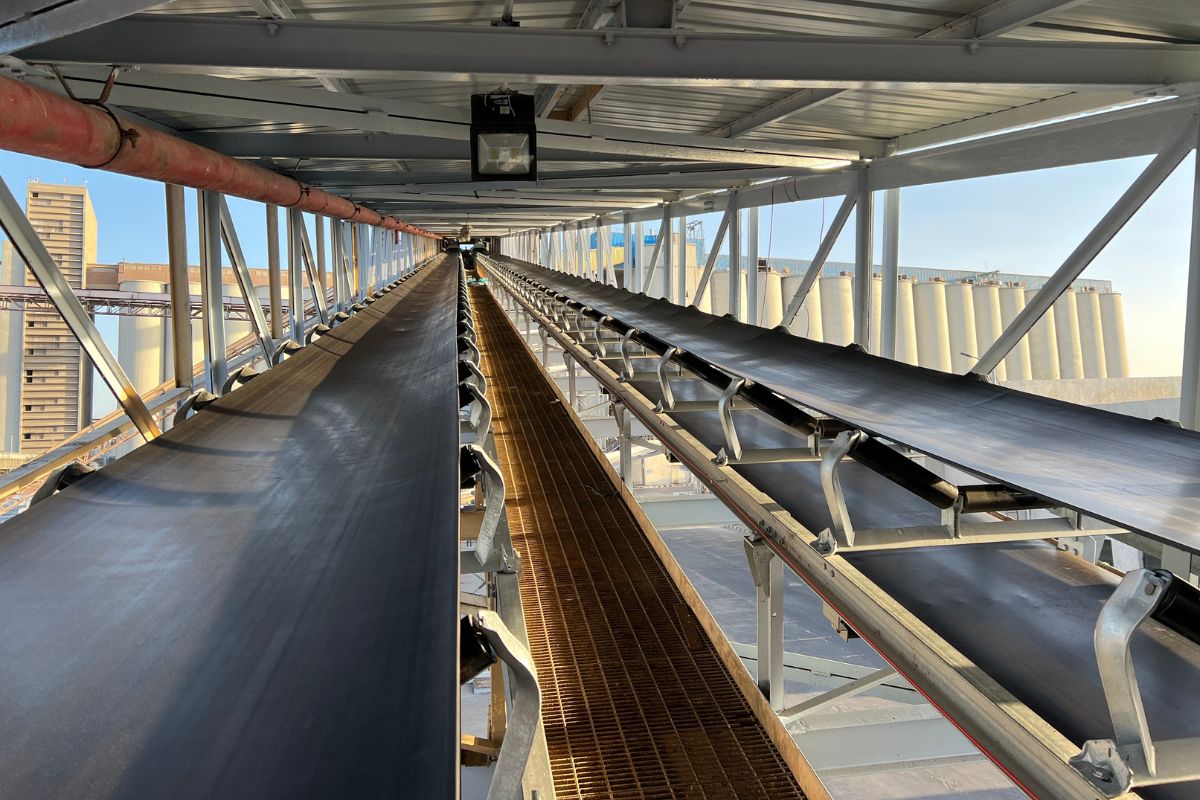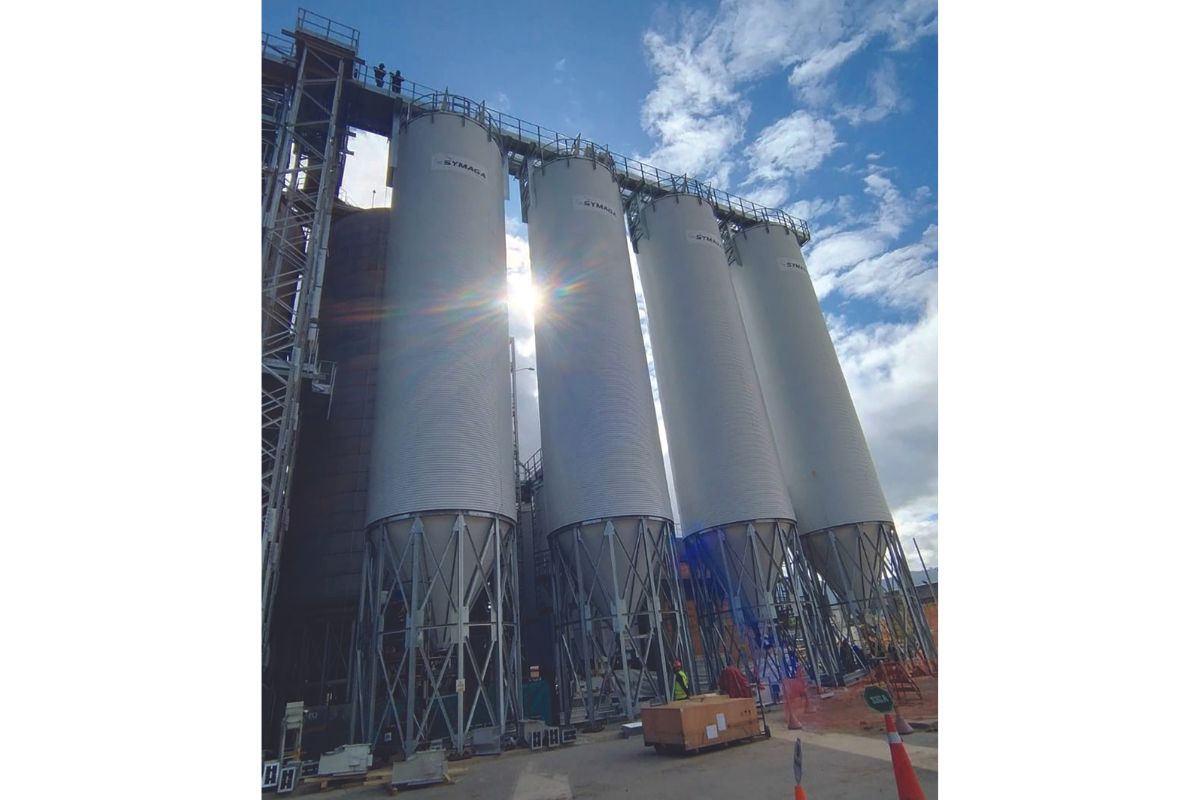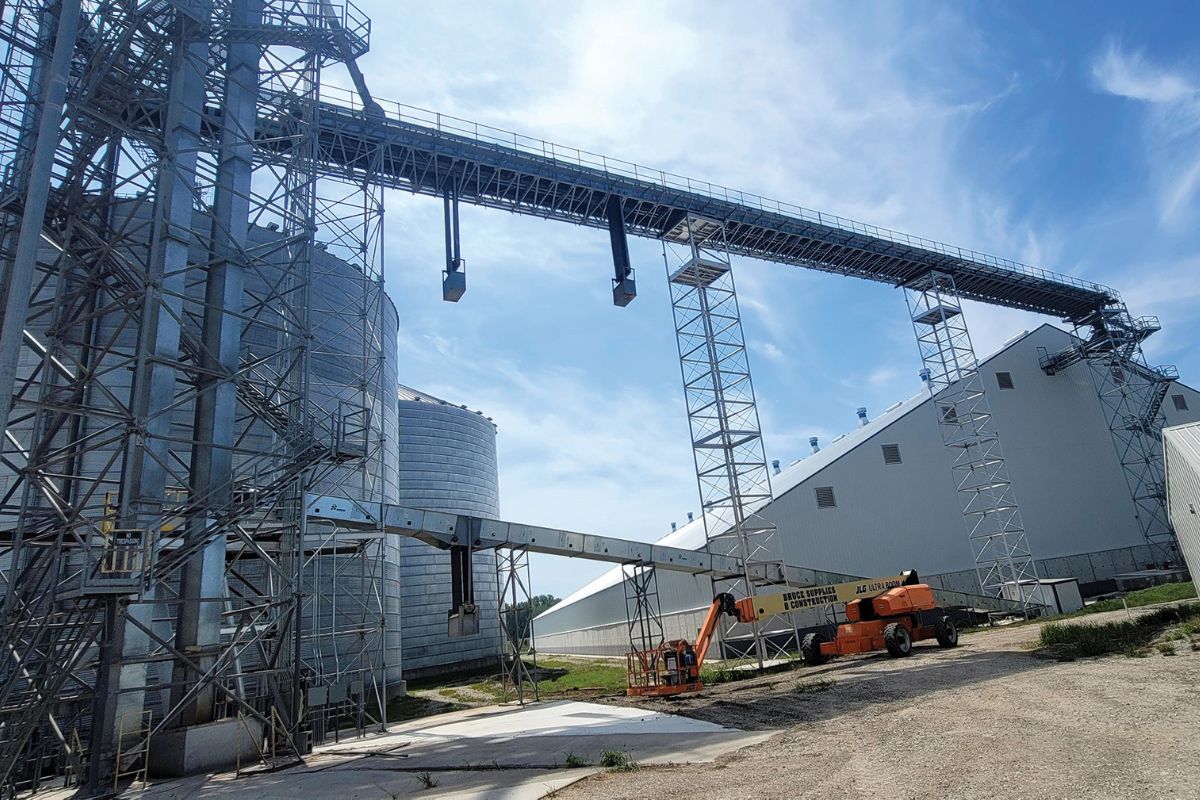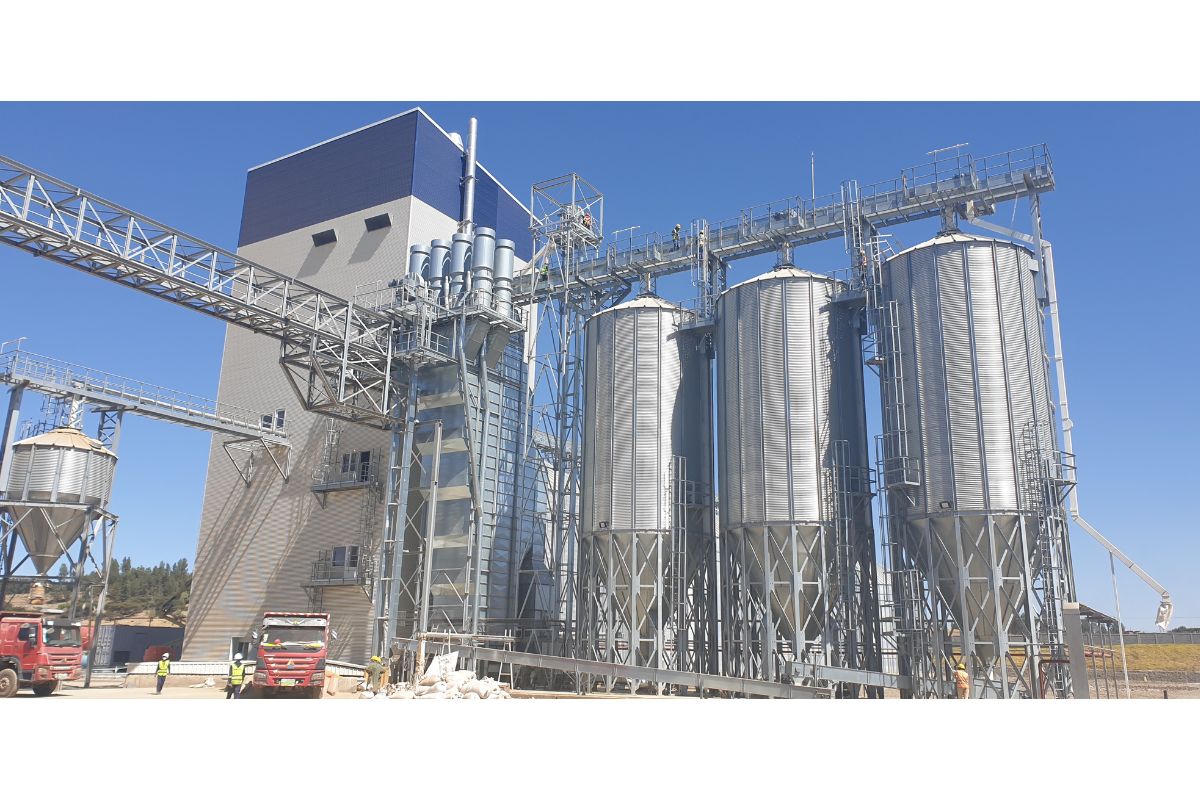KANSAS CITY, MISSOURI, US — With growing environmental concerns, economic pressures and consumer demand, sustainability continues to be a major concern in grain storage and handling projects.
The industry is adapting in several key areas to improve sustainability, including energy efficiency, reduction of greenhouse gas emissions, waste reduction and byproduct management as well as dust control and air quality, said Tobias Daniel, head of market segment, grain storage, for Uzwil, Switzerland-based Bühler.
Equipment manufacturers and suppliers who responded to a survey by World Grain also said the trend for larger storage bins continues and is driving demand for conveying capacities of more than 1,000 tph, one supplier said. Customers also are requesting ventilation and fumigation features.
Security and maintaining grain quality are also important, one supplier said, increasing demand for accessories such as fall speed reducers. Automation remains a top interest as well as cleanliness of facilities, particularly dust mitigation.
While expansion projects continue, there is slightly more demand for greenfield projects, particularly grain storage and handling facilities and flour mills.
Interest also is increasing in so-called food or industry parks, Daniel said. Food parks are high-capacity, high-quality processing centers located near farms and often shared by several different companies.
They cut emissions by eliminating long-distance transport of raw materials and dramatically reduce the potential for food to be lost, damaged or contaminated on the way.
“They allow companies to share facilities and byproducts, dramatically cutting both energy consumption and wastage as many of these byproducts can be turned into nutritious goods onsite,” Daniel said. “They allow companies to make optimum use of their resources while significantly reducing operational and maintenance costs and boosting transparency and flexibility.”
No matter the type or scope of a project, customers want to minimize risk, said Thomas Bang Mohr, sales director at Cimbria. As a result, they request the supplier take on a wider scope for the project, reducing the total number of suppliers in a project.
Across the globe, some of the areas seeing the most activity include the Middle East, North Africa, South America and parts of Asia.
Overall, there is continuous demand from emerging economies and development countries for grain handling infrastructure due to rising populations, growing economies and the need to improve food security, Daniel said.
Countries with large agricultural outputs such as the United States, Canada, Brazil, Argentina and Australia have consistent demand for modernization, expansion and efficiency improvements in grain handling facilities, including ports for export, he said.
The ongoing war between Russia and Ukraine has put projects in Russia on hold and the market in Ukraine is strongly reduced. A combination of conflict and climate change reducing local production is increasing demand from importing countries, suppliers noted.
Trade sanctions and embargoes require additional attention and resources to comply accordingly, said Bühler’s Daniel.
“Geopolitical tensions create uncertainty in the supply chain, which can disrupt contractual obligations,” he said. “Challenges in logistics, increased costs or risks to transportation routes, including maritime shipping lanes are examples. Contract terms may include clauses that address potential disruptions, leading to more complicated negotiations.”
Instability in currency values causes complications in financial arrangements for customers, which might result in delays and postponed investments.
“Financiers are more reluctant to provide capital for projects in certain areas that may hinder the ability to finance new grain handling facilities or expansion efforts,” Daniel said.
Issues with inflation mean projects are sometimes postponed, Mohr said, but in some cases grain routes are shifting.
“This is opening up new possibilities, where the business case was not strong enough before for our customers,” he said.
Geopolitical issues are and will always have an impact on business internationally, said one supplier.
“Whether it impacts trade and sailing routes, oil pricing or steel pricing, there is more happening in the world now that impacts us all,” they said.
For its third and most recent expansion of its grain storage facility in Guasave, Sinaloa, Mexico, Agrostar again turned to Chief Agri and dealer MEPROSA. The six-month project, which was completed in June 2023, included the addition of 15,000 tonnes of corn storage, bringing the facility total to 55,000 tonnes.
Agrostar first started working with Chief/MEPROSA in 2002 and has worked with the companies on its two previous expansion projects.
The most recent expansion included a silo model CB34-19 with a diameter of 105 feet, an eave height of 67 feet, 3 inches and an overall height of 96 feet, 5 inches.
The inclined chain conveyor has a capacity of 150 tph. Chief/MEPROSA also supplied the catwalk, support tower and connections.
GCSS updates conveying equipment

GCSS in Alexandria, Egypt, worked with CESCO for new belt and chain conveyors at its port grain terminal.
| Credit: ©CESCOThe General Company for Silos and Storage (GCSS) this spring completed the installation of new conveying equipment at its port grain terminal in Alexandria Port, Egypt. Work started in April 2023 and was completed a year later.
The facility includes 72 concrete bins with total storage capacity of 100,000 tonnes for wheat, barley and corn.
CESCO EPC GmbH, based in Konstanz, Germany, provided the conveying equipment with a capacity of 650 tph.
Work included replacement of chain conveyors and belt conveyors with a tripper on the top of the silos and a new automation system integrating the new equipment with the existing system.
The new equipment included two 650-tph high-capacity belt conveyors with total length of 235 meters from the jetty; two 650-tph high-capacity belt conveyors with a tripper feeding three silo inlets with total length of 156 meters on top of the silos; and four 650-tph heavy-duty double chain conveyors.
Other equipment provided by CESCO included spot aspiration filters on conveying equipment, electrical monorail hoist, maximum level indicators and an electrical cabinet with control system with MCC and PC visualization.
Dismounting existing equipment and installing and connecting hardware and electrical to the new equipment was challenging in terms of available space, mechanical and electrical interfaces. With the existing steel infrastructure and concrete silo openings, there was reduced space available for placement of the new equipment.
The final phases of the installation had to be completed while the facility was partially operating. The new equipment was seamlessly integrated into the existing facility and infrastructure.
This was CESCO’s first project with GCSS, but it has decades of experience providing grain storage and milling facilities in Egypt.
New storage for barley

Meura worked with Symaga for new barley storage for AB InBev.
| Credit: ©SYMAGAWhen designing storage in Salamina, Colombia, for Meura, a leading brewery supplier, Symaga had to take into consideration the highly corrosive environment. At the same time, the storage had to protect the malt for the end customer, AB InBev.
The silos have a smooth inner lining to improve the flow of the material and the cleanliness of the silo. They have a double wall and a special polyester powder paint on both sides for extra protection against corrosion and to provide extra insulation.
It took six months to complete the storage project, which has a total capacity of 11,705 cubic meters. Work was finished in July 2023.
The four hopper silos, model SCEX1070/17T45, are 29 meters tall while the 10 hopper silos, model SCEX535/13T60 are 21 meters tall.
Symaga, based in Villarta de San Juan, Spain, has worked with Meura on several brewery projects, including Grupo Modelo facilities in Apan, Mexico, and Port Elizabeth, South Africa, and a Zambian Breweries facility in Lusaka, Zambia.
Iowa co-op upgrades handling system

United Farmers Mercantile CO-OP most recent project with Sweet Manufacturing Co. and Bruce Supplies included upgraded handling equipment.
| Credit: ©SWEET MANUFACTURING CO.For more than 20 years, Sweet Manufacturing Co., along with its top dealer, Bruce Supplies, has planned and executed installations for United Farmers Mercantile CO-OP in Red Oak, Iowa, US.
Over the years, Bruce Supplies has supplied, installed, and serviced over 60 pieces of Sweet Manufacturing’s equipment, including those used to receive harvested grain, load rail cars, and maintain oil seed crush operations.
The recent additions include two 42-inch enclosed belt conveyors (300 and 515 feet) capable of processing 30,000 bph (750 tph). The installation also includes an ACE I 150-foot-tall elevator with a throughput of 4,700 bph (175 tph), and a Titan 15, 130-feet for 15,000 bph, corresponding to 375 tph.
The integration of Sweet Manufacturing’s equipment with monitoring systems and heavy-duty AR liners ensured the successful completion of the installation.
In September 2023, NEW Cooperative announced a merger with United Farmers. Sweet Manufacturing and Bruce Supplies are proud to report that the United Farmers Mercantile CO-OP was satisfied with the equipment and service. Looking ahead, Bruce Supplies and Sweet Manufacturing are committed to sustaining and maintaining consistent growth in Southeast Iowa and the new ownership.
Boortmalt adds Ethiopian facility

Boortmalt completed its first malting plant in Africa with Cimbria.
| Credit: ©CIMBRIABoortmalt, the world’s leading malting company with 3 million tonnes of production capacity, recently built and commissioned its first malting plant in Africa. The company has 27 malting plants on five continents.
The facility, located in the Debre Birhan industrial park in Ethiopia, has 60,000 tonnes of capacity and is supplied through local farmers. When needed, the facility can double its capacity.
Construction started in 2018, with production starting in 2021, overcoming challenges in terms of infrastructure, electricity and labor. In providing the turnkey project, Cimbria, based in Thisted, Denmark, drew on its expertise and experience from 50 similar facilities for coffee and seeds, such as sesame and maize, in Ethiopia.
The project included a 40,000-tonne storage facility/steel silo complex for the storage and processing of malt. Cimbria equipment in the malting plant included the conveying system, pre-cleaners, drum dryer, de-awner, indented cylinder, wet bins, load out bins, GSI silo bins, steel structure, machine tower and control and automation system.
Cimbria said it was approached by Boortmalt for the project because it had already successfully handled projects for Boortmalt in England and Ireland.
Boortmalt said it sees big potential in the Ethiopian market and is dedicated to supporting the local farmer community with increasing yield. The facility is important to the region, where it provided livelihoods to 20,000 local farmers, with an expectation to increase the supply chain to 50,000 local farmers. At full capacity, the malt facility requires between 70,000 and 80,000 tonnes of barley.






